- Home
- Patrick E. Andrews
Medicine Bundle
Medicine Bundle Read online
The final opening of the Indian lands in what is now part of present-day Oklahoma was a turbulent time. Luther and Fionna McCracken and their children sought a new beginning on the Medicine Bundle Grasslands, hoping to escape past unhappiness. Instead, they found themselves caught up in a struggle against both the law and lawless they couldn’t ignore if they were to make their dreams a reality. The final crushing dilemma came when their son joined the ranchers who were fighting to stop what they saw as an invasion by the homesteaders. And when the boy’s rebellion turned to outright banditry, the McCrackens had to face the catastrophic consequences.
MEDICINE BUNDLE
By Patrick E. Andrews
Copyright © 2016 by the Andrews Family Revocable Trust
First Smashwords Edition: March 2016
Names, characters and incidents in this book are fictional, and any resemblance to actual events, locales, organizations, or persons living or dead is purely coincidental. All rights reserved. No part of this book may be reproduced or transmitted in any form or by any means, electronic or mechanical, including photocopying, recording or by any information or storage and retrieval system, without the written permission of the author, except where permitted by law.
This is a Piccadilly Publishing Book ~*~ Text © Piccadilly Publishing
Editor: Ben Bridges
Published by Arrangement with the Author’s Agent.
Dedicated to the Memory of My Great-Grandfathers
Levi Russell Andrews
(1856-1945)
Homesteader, Oklahoma Territory
and
John Heidelberg Dace Terral
(1858-1933)
Cattleman, Indian Territory
Part One
THE GRASSLANDS
1888-1889
Chapter One
Charlie Ainsley slouched in the saddle, leaning forward slightly as he held his hand tight to his rumbling belly. He was on his way back to the Rocking H Cattle Ranch after overseeing a three-week round-up out in the far reaches of the Medicine Bundle Grasslands. His boss Dewey Harknell would want a full report on that annual chore of branding calves. This was the first part of the preparation for the coming cattle drive over the Kansas line to Wichita. From there the herd would be shipped by rail to the big stockyards in eastern cities.
Charlie was a muscular man in his early twenties. He stood barely five and a half feet tall, but was leather tough with a stubborn capacity to endure harsh physical discomfort. He had a natural sense of humor, but it was dulled at times by a streak of meanness fed by a bad temper.
At that particular moment in time, his clothes were crusted in sweat-salt and dirt, and bore the smell of wood smoke and burnt hair after long days of pushing red hot branding irons into the hides of squalling calves. To make an unpleasant condition worse, his body odor, sour with an unwashed staleness, was so pungent it annoyed even him.
Charlie belched, making a face at the taste it left in his mouth. He continued pressing his hand against his mid-section. The work crew had suffered from the trots after eating some bad bacon. Their daily toil was interrupted from time to time when weakened bowels forced them to quickly dismount from cowponies, and drop their chaps and trousers to squat down on their haunches. The stricken cowboys, holding onto the reins of their mounts, grimaced against the fluttering pain while dysentery waste spurted from their bowels.
A couple of the men had gotten so bad they couldn’t work at all. They spent several days lying on top of their bedrolls between bouts of watery defecation. It was touch-and-go for a while as their sickness grew more serious, but eventually the condition lessened enough for them to rejoin their pals in the long days’ toil. These men, born in primitive surroundings, had already borne potentially fatal ailments as infants. They were survivors with a built-up natural resistance to life-threatening disease and illness. Only the weakening of old age would bring them down when they reached their forties or fifties.
Charlie figured that he and the others spent about as much time taking shits as roping and branding. He knew Mr. Harknell was going to be mad about the delay in getting the job done. Next time the boss would have to be a hell of a lot more careful about what came out of that smoke house of his.
Luckily for him personally, Charlie’s stomach had been slowly improving. The last time he’d felt the need to answer nature’s call, he’d emitted no more than a short burst of bubbly flatulence. He was happy about that, since it meant after bringing Mr. Harknell up to date, he would be healthy enough to go into the town of Kensaw for an evening of fun. That was the crude little settlement near the ranch where the cowboys went to drink themselves insensible while occasionally turning their sexual fury on the two whores Fat Dora and Fanny.
After nearly a month without a poke, the stocky young cowboy was randy and ready. Best of all, with most of the crews still out on the range, he wouldn’t have to wait around to take turns to enjoy the gals’ collective charms.
A wisp of smoke, long and drifting, caught Charlie’s eye on the horizon. He reined back and watched it a bit. It went up and desperately clung to the sky before the wind whispered against it, fanning it to nothingness. Then another smoky shred made a slow ascent before drifting off. Charlie knew he had better investigate the source. The problem with squatters was growing worse with each passing season.
Charlie rode slowly in the direction of the smoke. As he drew nearer, he pulled his pistol from the holster on his hip, ready for trouble. If it were rustlers butchering stolen beef, they would not hesitate to kill anyone who might discover them. Justice was harsh and swift in ranch country, and getting caught with someone else’s cattle was a capital offense, quickly administered without the benefit of trial.
When the camp came into view, Charlie could see it was a small one, and there would be no problems there. A woman and teen-age girl were seated in front of a tent silently observing two males off to the side. The smaller fellow was clinging to the back of a wagon while the larger hit him regularly and hard with what appeared to be a strip of leather.
“Hello, the camp!” Charlie hollered out. Now that he was sure it was a family, he reholstered his pistol. The people stopped their activities and turned toward him. Charlie now saw that the person being whipped was a boy almost full grown. The cowboy boldly rode into the camp and stopped. He grinned at the youngster. “You’re kind of big to be getting a whipping, ain’t you?”
The boy remained silent, only glaring at the unexpected caller. The man, a tall, thin fellow with black hair and a large flowing moustache, held a piece of leather rein in his long, thin callused hands. “What is it you want here, mister?” he asked.
Charlie ignored the question as he continued talking to the boy. “My pa used to whip me too. He’d lay it on good and hard. O’course he was always drunk when he done it.” He looked over at the man. “Never sober. He wasn’t that mean.”
“What is it you want here, mister?” the man inquired again. The boy, whose pinched face showed the pain he had endured, let go of the wagon and straightened up. He didn’t seem any more pleased to see the visitor than the other members of the family.
Now Charlie noticed the man’s eyes under the bushy eyebrows. They showed a combination of wildness and ferocity. He realized that here was a fellow who could be trouble. Charlie put his right hand on the handle of his six-shooter. “My name is Charlie Ainsley. Foreman of the Rocking H Ranch.”
“I’m Luther McCracken.”
The females had drawn closer to listen, and Charlie noticed the girl, who appeared to be in her late teens, had been weeping. He thought her particularly pretty, but at that moment, her eyes were red and puffy from crying. He figured she was probably upset about her brother getting a tanning.
&nbs
p; The mother was a tired looking woman like so many in that part of the country. Her hair was dull and streaked with gray. Most wives died long before their husbands in marriages arranged as partnerships to make a living rather than for romantic love. But this woman had a look about her — intelligent eyes, the high arch of the eye brows, and the small nose — that made her appear as if she were out of her element in those rough surroundings. The cowboy turned his gaze to their camp. “It looks to me like you’re planning on staying a spell.”
“We are,” McCracken responded.
“You ain’t!” Charlie said. “You’re on Mr. Dewey Harknell’s range and he don’t like folks traipsing around on his property.”
“This is wide-open country not owned by nobody,” McCracken said.
“Well, you’re wrong as can be about that, mister,” Charlie replied. “This land belongs to the Cherokee Injun Nation. Mr. Harknell leases it from ’em. That’s like he owns it. That means nobody can use it ’cepting him. Mr. Harknell and them Cherokees has been working this deal for five years now, all proper and legal.”
“We’ll be staying,” McCracken said. He straightened up his lean, wiry frame, not shifting his angry gaze.
“Now looky here, mister,” Charlie said, glaring back into his face. “I been on a round-up for three weeks and a bit more, and I’ve a mind to have some fun in Kensaw tonight. So if I got to tell Mr. Harknell about you, then come back with some of the boys to kick you off the Grasslands, I’m going to be real mad about it.”
McCracken decided to keep quiet and let the cowboy do the talking.
Charlie didn’t care for the man’s silent insolence. “You’re gonna find this ain’t nothing to take lightly. I don’t know why you people think you can come in here and plop down any place that pleases you. Now I told you what you got to do or you’re gonna get treated right rough. It’d be a hell of a thing to put your family through. Particular the womenfolk.”
“Mister, I already told you what I was gonna do.”
“Then you know what we’re gonna do,” Charlie said. “See you in a bit.” He shook his head. “Mr. Harknell ain’t noted for being gentle.” He sensed the man wasn’t taking him seriously. “You been told. So if anything bad happens to you, it’s your own fault.” He looked over at the boy and winked. “If you get tired of getting your butt whipped, come on out here and be a cowboy. You can have fun and don’t have to hang on to a plow and stare at a mule’s ass.” He pulled on his horse’s reins and rode off from the camp.
The McCracken family watched him ride away. The wife walked over to her husband. “Could he be right, Luther?”
“No, Fionna,” Luther McCracken replied. “The fellow in Joplin told me that this part of the outlet was called the Medicine Bundle Grasslands. He said plain as day that it was unclaimed country that the government ain’t decided what to do with.”
“I just hope we ain’t gone from the frying pan into the fire,” Fionna said, referring to their previous troubles.
Luther sighed. “Well, maybe I should’ve looked into this more instead of just taking some feller’s word.”
“I’m thinking we’d best pack up now,” Fionna said. She gestured to her daughter. “Rebecca, get the cook stuff ready.”
“Wait a minute,” Luther said. “We ain’t done no harm. If that cowboy and his boss come back, we can talk it over.” He glanced at his son. “Silsby! Don’t just stand there. Go on and get back to packing grease in the wagon wheel like you was supposed to.”
“Yes, sir,” Silsby said. The boy walked toward the vehicle a little uncomfortably from the whipping he had just endured.
Luther watched him. “Wouldn’t it be nice to have that wheel seize up on account of you didn’t remember to keep it greased? We’d be stranded out here miles from help. They wouldn’t be nobody to give us a hand. If you let anything else slide, boy, I’ll whip you like you never been whipped before. If you cain’t act like a responsible man, I’ll treat you like a naughty little boy.”
The family went back to their camp chores. This time, because of the impending confrontation, they worked hurriedly. The woman and girl kept glancing toward the man as they packed away the dishes from breakfast. He ignored them as he went about his own tasks, doing his best to appear unconcerned.
~*~
Luther McCracken had always been his own man. He spoke rarely about his slant on things, but acted quickly and rashly to back them up when he felt the need. It was this habit of impetuosity that brought about the troubles that forced him and his family to flee their native Missouri.
During the War Between the States, Missouri had both pro-slavery and anti-slavery factions and areas. The Unionists outnumbered the Confederate sympathizers by almost four to one, but it was Luther McCracken’s misfortune to be a Unionist living in a county where the supporters of the South were in the majority. He was a dedicated abolitionist who had opposed the establishment of slavery in the state. If he’d kept his views to himself, he could have continued to live unmolested on the farm his family had owned for two generations.
In the summer of 1863 a detachment of Northern troops arrived in the bucolic neighborhood searching for a band of Confederate guerrillas. Luther’s neighbors had been giving the Rebel irregulars support, even provided them with hiding places between raids. The Federals went from farm to farm, meeting only hostility and stony silence in their efforts to glean intelligence on the raiders. But when they came to question Luther, he didn’t hesitate to give them information on the Rebels’ whereabouts. He also invited the Yankees to bivouac on his land.
The Union soldiers took advantage of Luther’s tips, and quickly located the guerrillas. In the gun battle that ensued, the Confederates managed to get away but not before almost half of them had been killed or captured. It was common knowledge throughout the area that Luther had collaborated with the Yankees.
Even after the passing of twenty-five years the tensions remained at a high level between the Northern and Southern factions in the county. Luther’s conduct during the war had not been forgotten nor forgiven by the Rebel sympathizers.
Occasional clashes between Luther and ex-Confederate neighbors continued to evolve into dangerous confrontations. Usually it happened when a few drunks decided to ride by and harass the McCrackens on their farm. Sometimes wild shots were fired that sent bullets crashing through the house. With the local law enforcement made up of unreconstructed Rebels, Luther knew it was only a matter of time before he or members of his family were murdered.
He wasn’t concerned about himself. If it wasn’t for having to worry about his wife and kids, he would have stood fast and fought the good fight even if he couldn’t win. Their safety was the only reason he made a difficult, irrevocable decision to leave his roots and seek the safety of a new, unsettled territory to start over out of harm’s way.
~*~
It was Silsby who spotted the three men coming over the horizon. They closed in quickly, and Luther turned away from the drainage ditch he was digging around the tent. Fionna called out, “Luther! Be careful!”
“I will. I don’t want no trouble.”
Fionna gestured to Rebecca and Silsby. “You children get over here with me.”
“Pa!” Silsby called out. “Should I fetch the Winchester for you?”
“No, boy. This ain’t the time to be armed.” Luther set the shovel down and walked out a short distance to wait for the horsemen.
When they arrived, the cowboy Charlie Ainsley gave Luther a reproving glare. “I reckon you think I talk just to be heard, don’t you?”
Luther remained silent, his arms folded across his narrow chest.
Charlie saw to the simple formalities. “This here is my boss Mr. Dewey Harknell.” He didn’t bother to introduce the other rider, a heavily-armed cowboy with a sullen expression.
Luther didn’t wait to be presented to the rancher. “I’m Luther McCracken.”
Harknell was a large, heavy man who seemed even too big for the ho
rse he rode. A bulbous nose dominated his ruddy face, and a bushy but well-tended handlebar moustache curled up defiantly on his upper lip. His voice was deep and loud. “My foreman Charlie says he told you this is my land, Luther McCracken.”
“Anybody can say anything.”
“Well, McCracken, I’m somebody that’s going to say plenty to you,” Harknell said. “I’m godamned sick and —”
“Watch your language!” Luther snapped. “I won’t have you using the Lord’s name in vain around my wife and daughter.”
Harknell pointed a large finger straight at Luther McCracken’s chest as if he were aiming a pistol. “You better get something through your head right now, mister. I’m the feller that runs this range. There ain’t no damn Boomer gonna come in here and set up a farm in the middle of my property which is leased legal from the Cherokee Injun Nation. And he damn well ain’t gonna tell me how I’m supposed to talk on it!”
“Do you have lease papers?” Luther asked. He sensed he had already lost, but he was stubborn enough that he wouldn’t cave in without at least a minimum show of defiance. “Anyone in the world can claim whatever he wants if he don’t have to show proof.”
“I ain’t showing you nothing!” Harknell growled, grabbing the handle of his holstered pistol. “This here Colt Navy six-shooter is the closest thing to paper you’re gonna see around here.”
Charlie Ainsley chuckled and shook his head. “McCracken, you’re a real dumb bastard. You know that? Even if this here land was open for settlement, you’d have to go to a government land office and stake a claim to get a legal deed to own it. You cain’t just go out and sit down somewheres and expect it to be yours.”
Harkness glared at Luther. “I ain’t gonna keep talking to you, sodbuster. Now you get off this range and get off now! That means you don’t go meandering out of here tomorry or the next day. I’m coming back in one hour. If you’re still here, we’ll burn ever’thing you have. I mean tent, wagon, gear and ever’thing. And we’ll shoot your mule too. Then you and your family can go Shank’s mare back up to the Kansas line.” He turned to Charlie. “You got that? In one hour, gather up a couple more of the boys then come back here and burn this sodbuster’s property. That’s everything ’cept the clothes on their backs. Then run ’em off!”

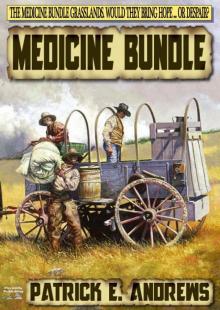 Medicine Bundle
Medicine Bundle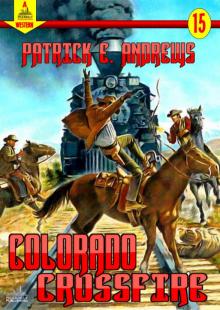 Colorado Crossfire
Colorado Crossfire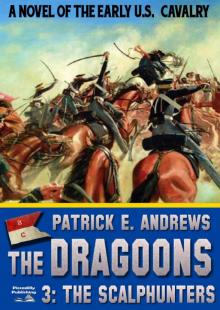 The Dragoons 3
The Dragoons 3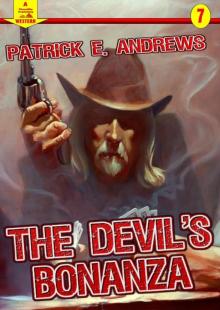 The Devil's Bonanza (A Piccadilly Publishing Western Book
The Devil's Bonanza (A Piccadilly Publishing Western Book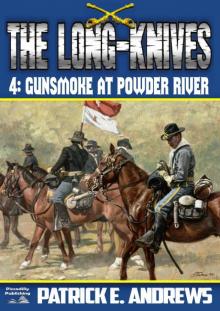 Gunsmoke at Powder River (The Long-Knives #4)
Gunsmoke at Powder River (The Long-Knives #4)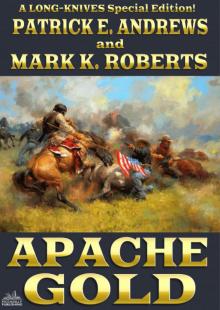 The Long-Knives 6
The Long-Knives 6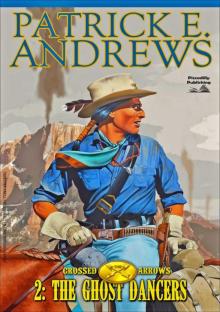 The Ghost Dancers (A Crossed Arrows Western Book 2)
The Ghost Dancers (A Crossed Arrows Western Book 2)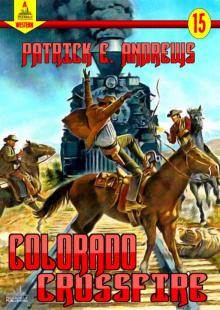 Colorado Crossfire (A Piccadilly Pulishing Western Book 15)
Colorado Crossfire (A Piccadilly Pulishing Western Book 15)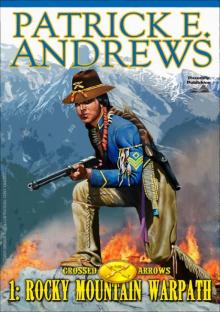 Rocky Mountain Warpath (A Crossed Arrows Western Book 1)
Rocky Mountain Warpath (A Crossed Arrows Western Book 1)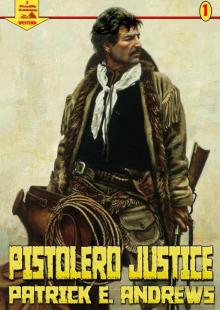 Pistolero Justice (A Piccadilly Publishing Western
Pistolero Justice (A Piccadilly Publishing Western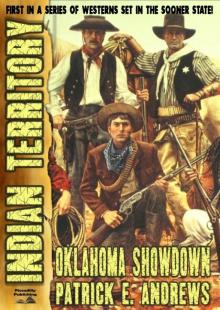 Oklahoma Showdown (An Indian Territory Western Book 1)
Oklahoma Showdown (An Indian Territory Western Book 1)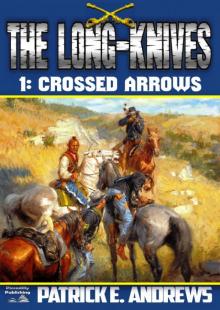 Crossed Arrows (A Long-Knives Western Book 1)
Crossed Arrows (A Long-Knives Western Book 1)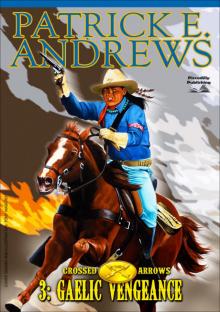 Crossed Arrows 3
Crossed Arrows 3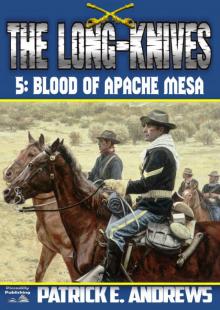 Blood of Apache Mesa
Blood of Apache Mesa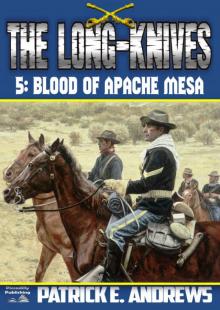 The Long-Knives 5
The Long-Knives 5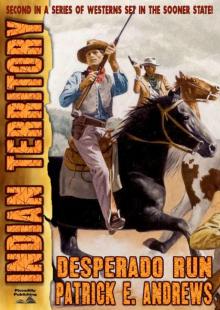 Desperado Run (An Indian Territory Western Book 2)
Desperado Run (An Indian Territory Western Book 2)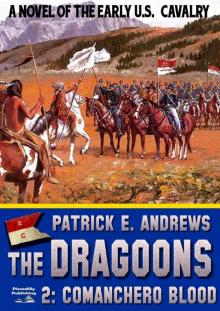 Comanchero Blood (A Dragoons Western Book 2)
Comanchero Blood (A Dragoons Western Book 2)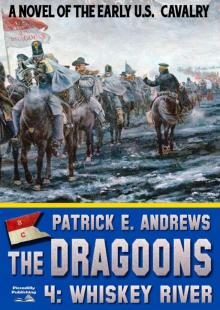 The Dragoons 4
The Dragoons 4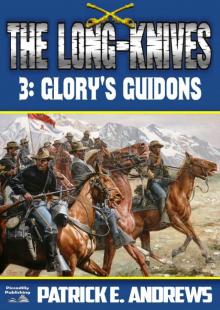 Glory's Guidons (The Long-Knives US Cavalry Western Book 3)
Glory's Guidons (The Long-Knives US Cavalry Western Book 3)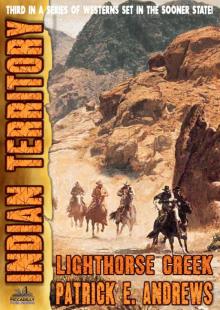 Indian Territory 3
Indian Territory 3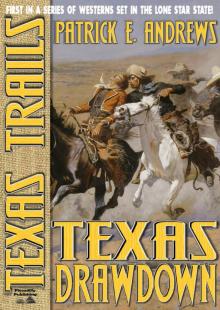 Texas Trails 1
Texas Trails 1